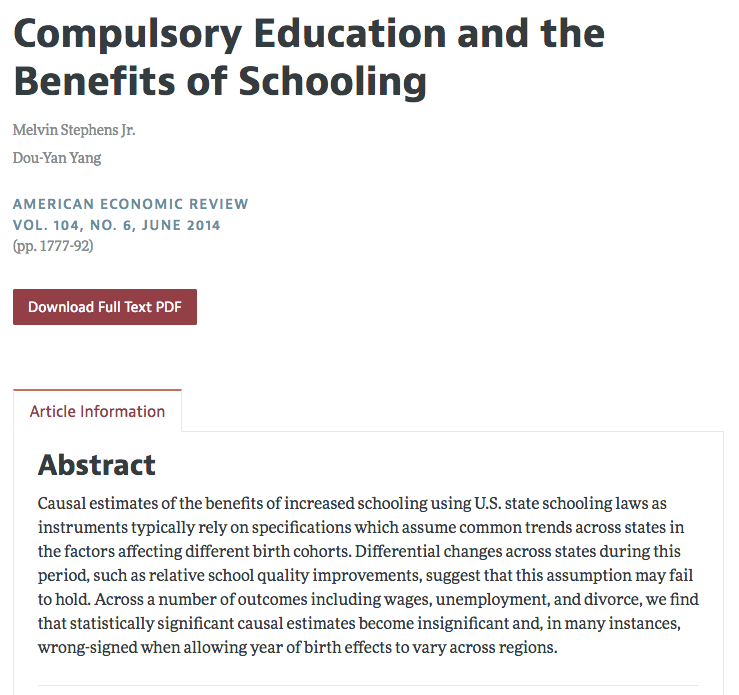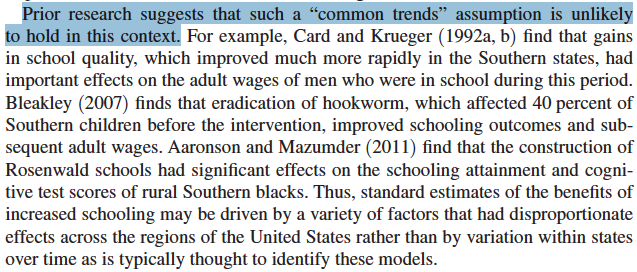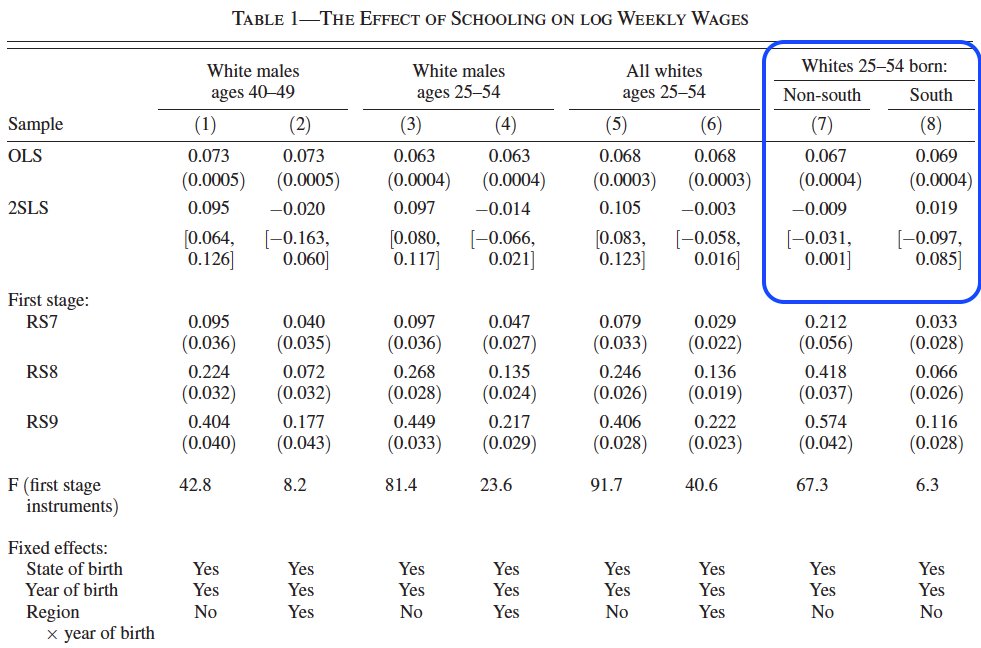One of the goals of #TweetABlackEconomistsPaper is to highlight the work of under-appreciated black economists, so I have to start with Mel Stephens Jr. -- no question about that https://twitter.com/dougwebberecon/status/1279142242746281988">https://twitter.com/dougwebbe...
[Now you might say, come on he& #39;s a Full Professor at Michigan Econ, which is Disneyland for Labor/Public economists -- true, true, but he still feels under-appreciated to me. I don& #39;t know Mel that well, but he has encouraged and inspired me, and I am a huge fan of his research]
I will pick Stephens & Yang AER paper on estimating the effects of compulsory schooling laws https://www.aeaweb.org/articles?id=10.1257/aer.104.6.1777">https://www.aeaweb.org/articles...
The other day I tweeted about papers that I send to students for "how to write a paper" https://twitter.com/ProfNoto/status/1278307160179511299,">https://twitter.com/ProfNoto/... and this paper should definitely have been on that list. When I teach this paper, I always say "now *this* is how to write a paper"
One reason I like teaching this paper is b/c it is a replication & extension of earlier influential research on compulsory schooling laws, and I like showing students a recent example of how to publish replication work in a leading journal [in this case, the AER!]
The main contribution of the paper is showing that IV estimates of the returns to schooling using compulsory schooling instruments are very sensitive to allowing cohort effects to vary by region
At first glance, that might seem like "just" a straightforward sensitivity analysis, but the authors describe historical work which provides many reasons why these differential cohort effects may be important confounding trends
Specifically, changes in school quality across states and regions, the eradication of hookworm, and the construction of Rosenwald schools are all possible confounding factors that may not have been adequately accounted for in the previous literature
If the main specifications in the literature assumed common trends across birth cohorts in different states, then that means that previous estimates may be driven at least in part by differential cohort trends in different regions
After reading Stephens & Yang it becomes (ex post) obvious that this can lead to bias if these differential trends are not accounted for and are correlated with changes in compulsory schooling laws
Turning to the main results, the authors find that the instruments are still reasonably strong even after including region-by-year fixed effects, but the 2SLS estimates become much smaller in magnitude
One nice (and memorable) way to see the authors& #39; main results is when they just re-run the 2SLS estimates separately in the Non-south & South (cols 7 & 8 below)
In both sub-samples they find zero returns to compulsory schooling using the "off-the-shelf" specification
In both sub-samples they find zero returns to compulsory schooling using the "off-the-shelf" specification
I think the most natural interpretation of these results is that previous research estimating significant returns to compulsory schooling was not adequately controlling for confounding trends
The end of the paper notes that the (revised) estimates place the US much closer to a great deal of international evidence on returns to compulsory schooling (the authors cite work on compulsory schooling in the UK, Norway, Sweden, and Germany)
That& #39;s a nice "bonus", since the paper both replicates & extends work in the US, but also helps understand some of the previously-puzzling differences b/w US & many other countries
I picked this paper b/c I& #39;ve taught it every year I& #39;ve taught grad labor to PhD students
But I am also a huge fan of Mel& #39;s other research, particularly his work on consumption responses (e.g., http://www-personal.umich.edu/~mstep/thirdof_final.pdf">https://www-personal.umich.edu/~mstep/th... & http://www-personal.umich.edu/~mstep/paydate_finalsub.pdf)">https://www-personal.umich.edu/~mstep/pa...
But I am also a huge fan of Mel& #39;s other research, particularly his work on consumption responses (e.g., http://www-personal.umich.edu/~mstep/thirdof_final.pdf">https://www-personal.umich.edu/~mstep/th... & http://www-personal.umich.edu/~mstep/paydate_finalsub.pdf)">https://www-personal.umich.edu/~mstep/pa...
I want to do more work at the intersection of consumer finance & labor economics for the next several years, but Mel has already been doing important work in this area for 15-20 years at this point
Here is another great thread about more of Mel& #39;s work: https://twitter.com/shariqueorg/status/1277198194032640000">https://twitter.com/shariqueo...
Here is another great thread about more of Mel& #39;s work: https://twitter.com/shariqueorg/status/1277198194032640000">https://twitter.com/shariqueo...
Lastly, Mel (like me) tries to bridge health economics & labor economics when he can. He has a new working paper studying the impact of health on labor market outcomes using data from a fascinating randomized experiment http://www-personal.umich.edu/~mstep/mrfit_180519.pdf">https://www-personal.umich.edu/~mstep/mr...

 Read on Twitter
Read on Twitter




